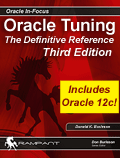 |
|
Freelists or freelist groups secrets
Oracle Tips by Burleson Consulting
April 9, 2003 |
Many people who experience segment header contention (buffer busy waits) are
confused about the proper use of multiple freelists versus multiple
freelist_groups for a table or index.
As we may know, multiple freelists add additional process freelists within a
single segment header, while multiple freelist groups add multiple segment
headers.
Of course, if you are using Oracle, the best solution is to redefine your
tablespace with automatic segment space management (ASSM) and use the
wonderful Oraclebitmap freelists.
As an old Oracle Parallel Server (OPS) DBA, we were taught that
freelist_groups were only for OPS and RAC, and that there should be one
freelist group per RAC node.
However, there is growing evidence that some segment header contention can
be relieved in non-RAC systems by adding multiple freelist_groups to tables
and indexes. This is especially useful for partitioned tables, and system
with extremely high DML activity.
Maybe the misunderstanding is from MOSC which suggests that segment header
contention is relieved with freelists:
According to MOSC Note:1060377.6
It is a good idea to always use the freelists option when creating a
table that will have high inserts or updates requiring new space contention
because this creates multiple process (segment) free lists instead of the
default ONE master free list on a segment header.
From MOSC note:
1029850.6:
As can be seen from the algorithms above, using multiple free lists may
cause some empty blocks to go unused, causing the segment to extend. If
performance is critical, multiple free lists can be used to improve
concurrent access, possibly at the expense of additional space used.
Steve Adams, the world famous Oracle Internals guru from
http://www.ixora.com.au/
has the following comments on this issue:
?Yes, freelist groups work almost as well as freelists for
avoiding contention on data blocks, and of course will also help to reduce
segment header block contention.
However, so far as avoiding data block
contention is concerned, freelist groups should not be part of your strategy
in a non-RAC environment. They do not work as well as freelists, and are
more expensive.?
However, there is
growing evidence that multiple freelist_groups are now used with
partitioned tables and system with Oracle parallel query (OPQ) to reduce
segment header contention.
From Melissa Holman - MOSC - 12/19/01:
"Free list
groups can have a positive impact in an exclusive environment, they're not
just for OPS. Free List groups will reduce contention on the segment header
by having concurrent processes attempting to insert assigned to separate
free list group blocks to look for blocks eligible for insert.
The algorithm
in a parallel environment uses the instance/thread number to assign an
instance to a free list group. In an exclusive environment, the process
number is used to assign a process to a free list group.
The primary cost
with using multiple process free lists or multiple free list groups is
increased space usage, but in a highly concurrent insert environment, the
performance gains will far outweigh the potential downside of a little extra
space being used."
Many related topics are covered in my book Oracle Tuning: The Definitive Reference by Rampant TechPress.
http://www.rampant-books.com/book_1002_oracle_tuning_definitive_reference_2nd_ed.htm
References:
MOSC note:
1029850.6: "As can
be seen from the algorithms above, using multiple free lists may cause
some empty blocks to go unused, causing the segment to extend. If
performance is critical, multiple free lists can be used to improve
concurrent access, possibly at the expense of additional space used."
This MOSC paper "Free
list management in Oracle8i
"
is also excellent for describing the sharing issue with linked-list (non
ASSM) freelists (emphasis added):
?There are three main types of
freelists used to manage segment space; the Master Freelist, the Process
Freelist and the Transaction Freelist. Each one controls its own set
of datablocks . . . ?
?When using multiple process freelists, the amount of unused space
within datablocks can increase. The reason for this is a user process
maps onto a particular process freelist using an algorithm (described
below), and will not search other process freelists for space if none
is found within its own. If a large number of blocks are linked in a
particular process freelist, and another user process has no free blocks
on its process freelist or no free blocks exist on the master freelist,
the process may request movement of the HWM or creation of a new extent.
This could leave free blocks on the other process freelist unused.?
 |
If you like Oracle tuning, see the book "Oracle
Tuning: The Definitive Reference", with 950 pages of tuning tips and
scripts.
You can buy it direct from the publisher for 30%-off and get
instant access to the code depot of Oracle tuning scripts. |
